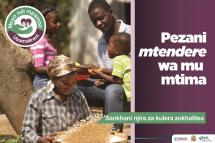Country Focus: Malawi
Malawi BRIDGE I and II
BRIDGE was designed to energize change in the way Malawians think and speak about HIV/AIDS and more importantly, in how they act.
BRIDGE is an acronym for:
- Belief in a better future (hope)
- Risk is shared by everyone (personalized risk)
- I can STOP AIDS (personal responsibility, action, self-efficacy)
- Discussion about HIV/AIDS (openness, destigmatization)
- Gender equity (girls’ empowerment and changed men’s behavior)
- Emphasizing the positive (action orientation, community assets, positive role modeling)
The project’s objectives were:
- Increase the median age at first sex
- Increase condom use by adults with non-r
- Decrease unmarried youth 15-24 having sex in last 12 months
- Decrease number of men reporting more than one sexual partner during the last 12 months
- Increase condom use by unmarried youth
Support for Service Delivery Integration (SSDI)
In 2011, USAID Malawi awarded the five year, US $100 million Support for Service DeliveryIntegration (SSDI) Project, consisting of three separate, but interrelated Cooperative Agreements: SSDI-Services, SSDI-Systems and SSDI-Communication. SSDI Services works withthe Government to achieve improved service delivery; SSDI Systems to improve policies, management and leadership; and SSDI Communication to support social and behavior change communication (SBCC). SSDI-Communication was implemented by JHU/CCP in collaboration with Save the Children. SSDI-Communication developed and disseminated behavior change communication materials on 6six priority health areas- family planning and reproductive health, malaria, HIV/AIDS, maternal, neonatal and child health, nutrition, and WASH, all under the Moyo ndi Mpamba (Life is Precious) campaign.
This campaign, the title of which means “Life is Precious, Take Care of It!” was part of the Support for Service Delivery Integration (SSDI)-Communication project, implemented by the Johns Hopkins Center for Communication Programs (CCP) and partners in Malawi from 2011-2016.
Other SSDI project materials here
Source: Johns Hopkins Center for Communication Programs
Date of Publication: October 7, 2020
SIMILIAR RESOURCES
Tools
Examples
- Creating Mobile Health Solutions for Behaviour Change: A Study of Eight Services in the mNutrition Initiative Portfolio
- Community Communication MNCH e-Manual: Participatory Health Promotion Sessions
- Guide de Formation Conseil Dépistage du VIH au niveau Communautaire: manuel à l'intention du personnel non médical
- Plan Stratégique National de Plaidoyer en matière de lutte contre le Paludisme (PSNPP) en Côte d'Ivoire 2018-2023
- WASH FIT / WASH FIT Mobile
- Advocating for Change for Adolescents’ Toolkit
- MULTI-SBC: The Programmatic Aid for Multi-Sectoral Integration of SBC for FP Practitioners
- GESI Toolkit
- Using Data to Design an Evidence-based Social and Behavior Change Program in Rural Nepal
- Advocating for Social Marketing Programs to Local Stakeholders

